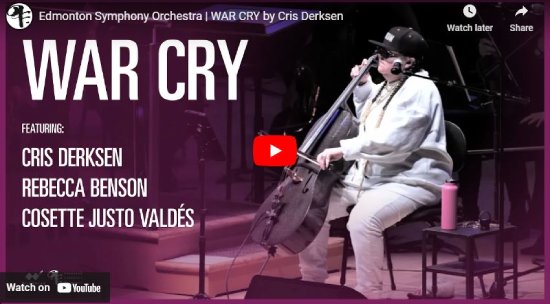The piece opens with a bang, or rather, a flurry of pounding percussion and crackling sticks that creates a palpable sense of excitement and danger, before the horns and strings provide a melodic hook that’s almost equally dramatic. It’s Controlled Burn, by Cris Derksen, a cellist and composer from Treaty 8 territory in northern Alberta, who has a beautiful way of combining Indigenous, classical, and contemporary music.
Controlled Burn was commissioned by Montréal’s Orchestre Métropolitain, under Yannick Nézet-Séguin, and it simulates the sounds of a forest fire. But rather than the out-of-control wildfires we’ve experienced in the past few years, it recalls managed fires used by Indigenous peoples for thousands of years to clear forest debris and protect trees and wildlife. And the way it came together highlights Derksen’s unique approach to composition.
“I was thinking of the idea of smudging and cleansing the earth, and within smudge there’s the fire aspect, so then I knew I wanted it to be about the controlled burn,” they say. “I talked to Amy Christiansen, the Indigenous fire person with Parks Canada, about how fire gives nutrients to the land, and opens up seeds and pine cones. It’s about reciprocity, keeping the ground safe and making sure we have animals and fish to eat. And the feelings that come out of that idea, that hope of keeping our land safe, were helpful to the process.”
Derksen says pre-contact Indigenous burns were community events, but now we have a more militarized view of fires. “The mood is different – it’s a battle, and rightfully so now. So, in the piece I have some military accents, especially with the percussion, and my drum machine has a beautiful explosion. I started the piece with a technique called collegno, where you put the stick of the bow on the string so it bounces. I got the cello and basses to do that, so it sounds like the crackle, the first spark of a fire. There’s a moment when the orchestra does loops with me, and then I take over in a solo section where I make the sounds of birds flying. It’s a very emotive moment, and then I add the explosion, so it’s pretty powerful.”
Derksen ingeniously merges different musical worlds by bringing cello into electropop, and electropop and Indigenous music into the classical orchestra, broadening minds in all those spheres. They’ve played their cello solo with a multi-effect pad, with a drum machine, with a loop station, with their band, and as a guest soloist with classical ensembles. But after the release of their third album, 2016’s Orchestral Powwow, which brought classical cello and powwow music together in intriguing ways, commissions from orchestras started coming in.
Controlled Burn, written in the Summer of 2023, has been performed in Montréal, Philadelphia, and New York’s storied Carnegie Hall, and is scheduled for the Saskatoon Symphony in October of 2024, and the Calgary Philharmonic in the Spring of 2025, while a new piece is planned for the Toronto Symphony’s 2025-26 season. Derksen’s music has also been featured in a work by the Royal Winnipeg Ballet, and in 2024 alone they’ve scored a feature film and two documentaries, including a National Geographic doc about the Hudson Bay region.
“Scoring a film is a different ballgame,” they say. “It’s still sonic storytelling, but as a composer you’re not in the driver’s seat necessarily, you’re working with the director to figure out what the feel is, and it’s challenging. You also have to think about how to underscore for the story without overtaking it, so it can’t be too big or too busy.”
Next comes co-writing with clients from the Centre for Addiction and Mental Health, and heading to Banff to run the Indigenous Classical Music program, with nine participants and two other faculty members. “It’s really opened the doors for Indigenous folks in the classical world,” says Derksen, “and helped the classical world to realize there are professional Indigenous folks in that field. I’m always pushing to open those doors, and keep them open.”
If that weren’t enough, Derksen’s fourth album, The Visit, will be released in November of 2024. “It’s going back to my electro roots, but it has a chamber element,” they say. “I’ve beefed up my band to a seven-piece: two violins, a trumpet, drums, my cello, my wife Rebecca Benson sings with me, and we have a hoop dancer. I was struggling over how to make an album do all the things I do as a composer, and I feel like this has a good balance between improv, and classical, and electronic, and chamber works. It touches on so many genres within my own musical language, and I’m excited.”
